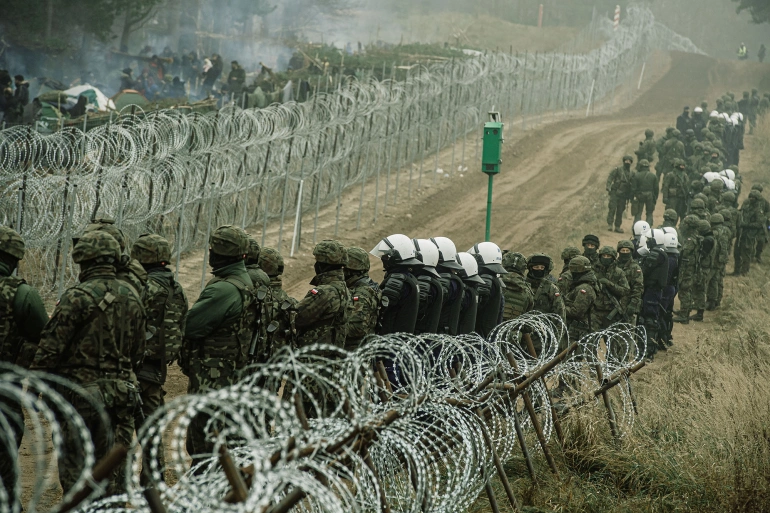Belarus Creates a Migrant Crisis on the Polish Border
Lukashenko Plays Politics with Vulnerable Lives
Irek Dorozanski/DWOT/Handout via Reuters
Polish Military determined to keep migrants from entering. On the border near Kuznica, Poland
An escalating border crisis is unfolding along the Polish/Belarusian border, with migrants being used as human pawns in a geopolitical chess game. An estimated 4,000 migrants are camped at the Polish border, with an estimated 20,000 total in Belarus. They are trying to cross the barbed-wire fences into the E.U. from Belarus, and the situation is becoming desperate. At least 11 people have died in the cold so far, and migrants continue to flood in every day. No country has offered to take the migrants, and the E.U. and U.S. have backed Poland as they and Belarus exchange threats, insults, and warnings. This crisis is not like the one in 2016-17, when more than a million migrants primarily fleeing civil war in Syria arrived in Europe, though. It is a new kind of warfare, one that has most likely been orchestrated by Europe’s self-proclaimed last dictator, the Belarusian autocrat Aleksandr G. Lukashenko.
A large majority of the migrants, who are camped out in temperatures below zero, are Syrian and Iraqi ethnic Kurds. They came to Europe coerced by Belarusian authorities, and were given visas, one way plane tickets to Minsk, the Belarusian capital, and wire cutters. They were then urged to breach fences, break barriers, and forbidden from returning to Belarusian cities. Lukashenko claimed last year to have won the Belarussian presidential election in a landslide with more than 80 percent of the vote. The elections, however, were widely seen as illegitimate because they were riddled with fraud and inconsistencies. The largest protests in Belarusian history, as well as extreme sanctions from the E.U. followed. This move to allow and attract thousands of migrants hoping to reach far wealthier European countries in the West was orchestrated most likely with the goal of destabilizing the E.U. and having his sanctions lifted. Lukashenko is also acutely aware of anti-immigrant sentiment in Poland, his country’s top rival, and how much damage this manufactured crisis could create. Another of Lukashenko’s goals may be to gain public support and pose as a humanitarian. He began allowing cameras and reporters to come to the scene as he brought in ambulances and medics. Belarusian authorities have now moved the migrants to a warehouse near the border, further enforcing the humanitarian image. Lukashenko also accused Poland of crimes against humanity as its soldiers sprayed migrants with water and tear gas. Whatever Lukashenko’s motives, he is callously putting human lives on the line for his personal benefit.







